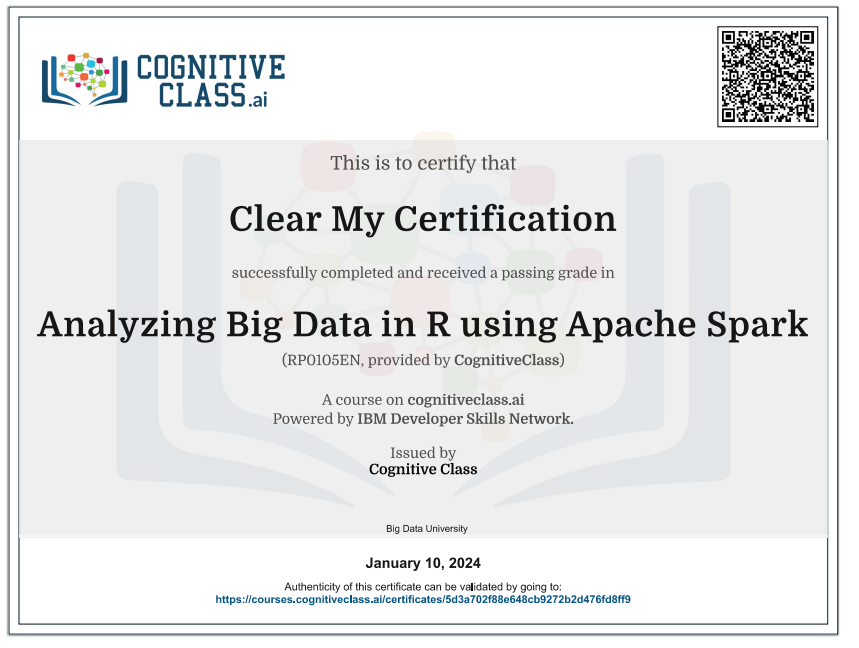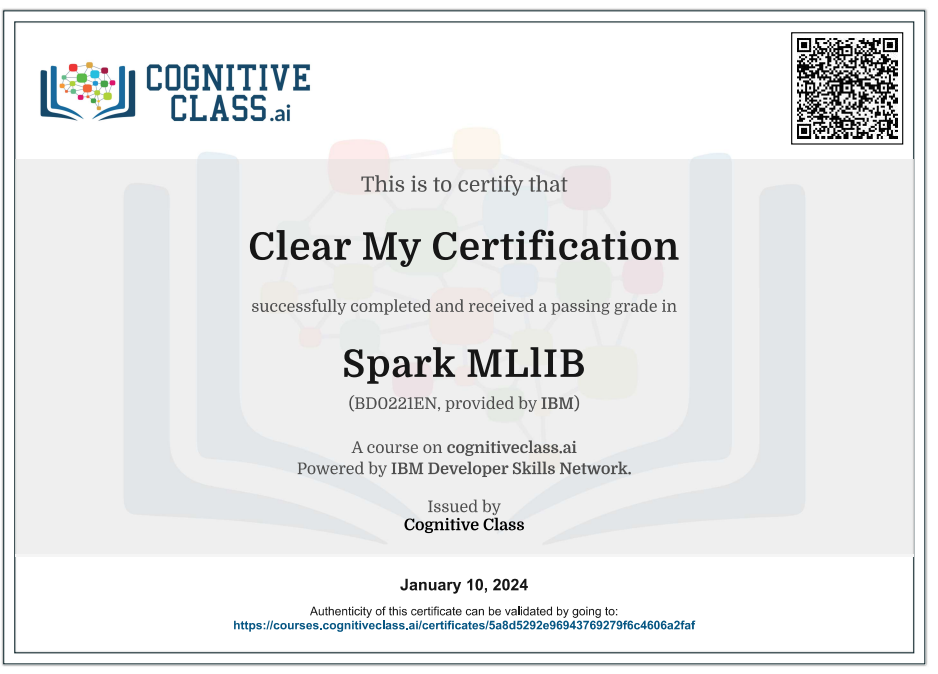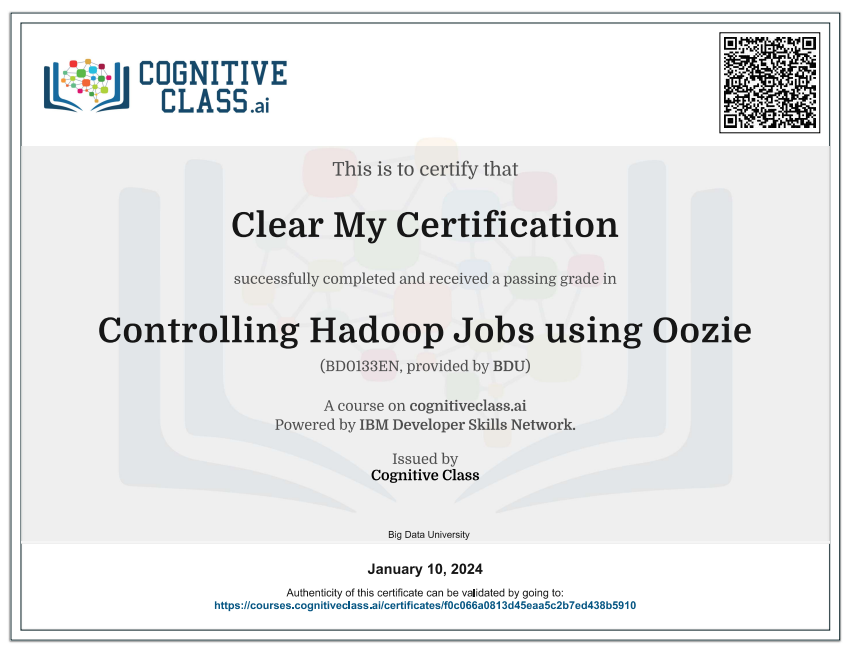Enroll Here: Data Science 101 Cognitive Class Exam Quiz Answers
Data Science 101 Cognitive Class Certification Answers

Module 1 – Defining Data Science Quiz Answers – Cognitive Class
Question 1: From the reading In the report by the McKinsey Global Institute, by 2018, it is projected that there will be a shortage of people with deep analytical skills in the United States. What is the size of this shortage?
- 140 000 – 190 000 people
- 120 000
- 20 000 – 50 000 people
- 800 000 – 900 000 people
- 3 – 6 million people
Question 2: What has changed from the past to make Data science an in-demand occupation?
- There is now a lack of data
- Laws have changed
- Vast amount of data date being created
- The advent of the free market
Question 3: What is the minimum education requirement to become a data scientist?
- You must have a Degree in Computer Science
- You must have a Master’s degree in Statistics
- You must have a Ph.D. in Machine learning
- The above are all helpful, but they are not necessary to become a data scientist, education backgrounds of data scientists vary
Module 2 – What do data science people do Quiz Answers – Cognitive Class
Question 1: What is structured data??
- Data that can be stored in a database or some tabular form
- Images and video
- Segments of text
- Audio data
Question 2: What does the following formula represent: Base fair + Time x (Time in cab)
- The possible formula used in regression analysis to determine the cost of a cab ride
- The formula used to build a recommender system for rating a cab service
- A possible formula used in regression analysis used to determine the price of a house
- What is the impact of lot size on housing price?
Question 3: In the reading, what is an example of a question that can be put to a regression analysis?
- Do homes with brick exterior sell in rural areas?
- What is the impact of lot size on housing price?
- What are typical land taxes in a house sale?
- How much does a finished basement cost?
- How much should a house near a park cost?
Module 3 – Data Science in Business Quiz Answers – Cognitive Class
Question 1: Complete the following sentence that best explains why business needs to capture data: At the end of the day, for businesses, they know one thing, that if they are unable to measure something:
- they are unable to graph it
- they are unable to improve it
- they are unable to show compliance with tax laws
- they are unable to facilitate meetings between sales and marketing
Question 2: A business should never:
- delete data
- use Machen learning
- well document data
- use PowerPoint to deliver a message
Question 3: In the reading above, what is the role of the data scientist?
- Email the stakeholders about the analysis
- Manage a team of analysts to create a model
- Develop the strategy to fix the problems in the findings
- Use the insights to build the narrative to communicate the findings
- Use the data to tell the story the CEO wants to tell
Module 4 – Use Cases for Data Science Quiz Answers – Cognitive Class
Question 1: What popular product is primarily based on data science:
- Smartphone
- Google search
- Space X’s rockets
- Tesla’s Electric Cars
Question 2: From the readings the results section is where you present:
- The empirical findings
- R Squared
- The conclusion
- The contributors
- The methods used
Question 3: Complete the sentence: Predictions are useful?
- they are always correct
- but you need lots of data
- but they must come from a complicated model
- they are always wrong
Module 5 – Data Science People Quiz Answers – Cognitive Class
Question 1: In the reading, how does the author define ‘data science’?
- Data science is way of understanding things, of understanding the world
- Data science is a physical science like physics or chemistry
- Data science is some data and more science
- Data science is what data scientists do
- Data science is the art of uncovering the hidden secrets in data
Question 2: In the reading, what is admirable about Dr. Patil’s definition of a ‘data scientist’?
- His definition limits data science to activities involving machine learning
- His definition is only for people who program in Python
- His definition excludes statistics
- His definition is about weaving strong narratives into analytics
- His definition is inclusive of individuals from various academic backgrounds and training
Question 3: A good data scientist should?
- calculate confidence intervals
- be sceptical
- use complicated models
- only use big data
Data Science 101 Final Exam Answers – Cognitive Class
Question 1: In the reading, the output of a data mining exercise largely depends on:
- The engineer
- The programming language used
- The quality of the data
- The scope of the project
- The data scientist
Question 2: What has changed from the past to make Data science an in-demand occupation?
- There is now a lack of data
- Laws have changed
- Vast amount of data date being created
- The advent of the free market
Question 3: You develop an algorithm to predict rainy days, your algorithm predicts a rainy day, but the prediction is false. What is the following an example of?
- the r squared
- ture negatives
- false positive
- generated values
Question 4: What is an example of regression problem
- Finding an object in an image
- Reducing the size of a dataset
- Predicting the price of a house using the square footage
- Finding clusters in the data
Question 5: What should be a prime concern for storing data?
- Data safety and privacy
- Hiring the right database manager
- The size of the files
- The physical location of the servers
- Hadoop clusters
Question 6: What is a good starting point for data mining?
- Data Visualization
- Writing a data dictionary
- Non-parametric methods
- Creating a relational database
- Machine learning
Question 7: Complete the following sentence that best explains why business needs to capture data: At the end of the day, for businesses, they know one thing, that if they are unable to measure something:
- they are unable to graph it
- they are unable to improve it
- they are unable to show compliance with tax laws
- they are unable to facilitate meetings between sales and marketing
Question 8: When establishing data mining goals, the accuracy expected from the results also influences the:
- The timelines for the project
- The scope of the project
- The costs
- The presentation
- Data scientist
Question 9: When processing data, what factor can lead to errors in data?
- Synchronizing the database
- Changing services providers
- Renaming variables
- Human error
- Overfitting
Question 10: A good data scientist should?
- calculate confidence intervals
- be sceptical
- use complicated models
- only use big data
Introduction to Data Science 101
Data science is a multidisciplinary field that uses scientific methods, processes, algorithms, and systems to extract insights and knowledge from structured and unstructured data. It combines expertise from various domains such as statistics, mathematics, computer science, and domain-specific knowledge to analyze and interpret complex data sets. The goal of data science is to uncover patterns, trends, and valuable information that can inform decision-making, solve problems, and drive innovation.
Key components of data science include:
- Data Collection:
- Gathering relevant data from various sources, including databases, APIs, sensors, logs, and more.
- Data Cleaning and Preprocessing:
- Cleaning and transforming raw data to ensure accuracy, completeness, and consistency. This step may involve handling missing values, outliers, and formatting issues.
- Exploratory Data Analysis (EDA):
- Analyzing and visualizing data to understand its characteristics, identify patterns, and gain insights into the underlying structure.
- Feature Engineering:
- Creating new features or variables from existing data to improve the performance of machine learning models.
- Modeling:
- Applying statistical and machine learning algorithms to build predictive or descriptive models. This step involves selecting appropriate models, training them on historical data, and evaluating their performance.
- Validation and Evaluation:
- Assessing the performance of models using validation datasets to ensure their generalizability to new, unseen data.
- Deployment:
- Implementing models into production environments to make automated predictions or support decision-making.
- Monitoring and Maintenance:
- Continuously monitoring model performance and updating models as needed to ensure their relevance and accuracy over time.
- Interpretation and Communication:
- Interpreting the results of data analyses and communicating findings to non-technical stakeholders through reports, visualizations, and presentations.
Data science is widely used across various industries, including finance, healthcare, marketing, and technology, among others. It plays a crucial role in transforming large volumes of data into actionable insights, driving informed decision-making and innovation. Python and R are commonly used programming languages in data science, and tools like Jupyter Notebooks, TensorFlow, and scikit-learn are popular for analysis and modeling.
 Clear My Certification All Certification Exam Answers
Clear My Certification All Certification Exam Answers



